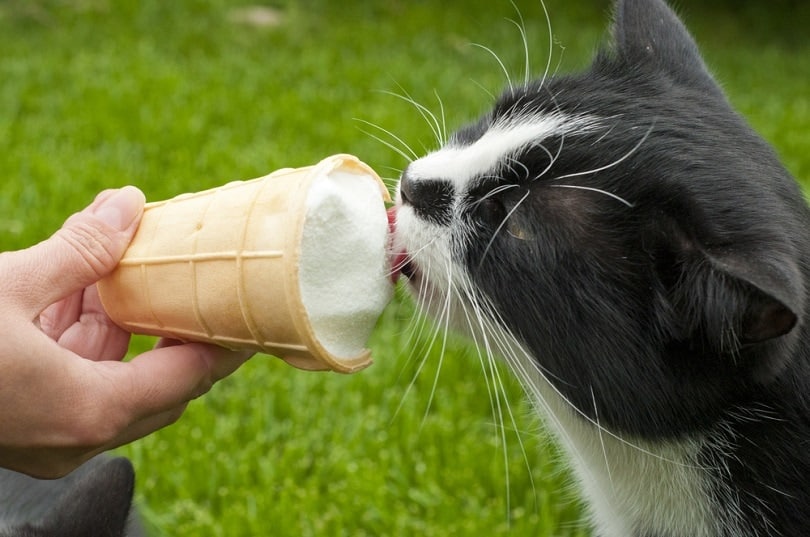Vanilla, scientific name Vanilla planifolia, is not toxic to cats in its natural form, but it is also not something cats should be eating. As an ingredient, it doesn’t actually add much to the food but flavor, which cats do not require.
A very small piece of vanilla bean is unlikely to cause significant harm to your cat if ingested accidentally, but larger amounts can lead to digestive issues. The real danger are products that contain processed vanilla, alongside other ingredients, such as chocolate, alcohol, excessive sugar, or dairy, some of which are directly toxic to cats, while others are potentially harmful.
Therefore, we do not recommend feeding your cat processed foods with vanilla, or making a habit of offering natural vanilla in its raw form. Consult with your veterinarian if your cat has eaten any vanilla products with other toxic or harmful ingredients, such as alcohol and chocolate, as they will need immediate veterinary attention.
Can Cats Taste Vanilla?
Cats have different taste buds than ours and taste things differently than we do. However, we do not know exactly how they taste these things. We can’t ask them, after all. (And, even if we could, how would we compare tastes?) Unless we discover a way to get into our cat’s bodies, we likely won’t know any time soon!
However, science now knows that cats can’t taste sweet foods, as they lack a sweet taste receptor.1 In people, processed vanilla seems to activate the receptors for bitterness as a secondary sensation due to vanillin being a major compound in processed vanilla.2 However, due to lack of scientific data on how vanilla tastes to our feline companions, we can only guess at this stage.
Some owners may state that their cats like vanilla, but this is just anecdotal and not based on science. Still, we don’t know if it tastes the same way to both humans and cats, and we would not recommend giving your cat vanilla products just to find out. Here are a few reasons why.
Is It Okay to Give Cats Vanilla Ice Cream?
One of the most common ways cats are introduced to vanilla is in vanilla ice cream. However, this is not necessarily okay for them to eat. While a quick lick may not bother most cats, ice cream contains a lot of ingredients that aren’t best for their digestive tracts.
Firstly, most ice cream is very high in sugar, flavorings, and additives, so we do not recommend it for felines. Sugar is simply empty calories. It does not provide your cat with any valuable nutrients. Also, excess calories can cause them to gain extra weight if they eat too much of it too regularly, or if they are not exercising adequately.
Secondly, ice cream is also made with dairy products. Most cats are lactose intolerant and may experience stomach upset. Of course, the exact level at which each cat is sensitive to dairy varies. Some cats are extremely sensitive and may have bad diarrhea after consuming a little bit of ice cream. Others may be fine unless they eat a significant amount.
Either way, dairy is usually not suitable for cats after they reach adulthood.
Thirdly, many ice creams contain other ingredients. While these may be safe for you, they may not be for your feline. For instance, some artificial sweeteners can be harmful to cats. Reading the ingredient list is crucial to ensure that there is nothing toxic in the vanilla ice cream, particularly if your cat has accidentally had quite a few licks. Speak to your vet if you are not sure.

Is Vanilla Toxic to Pets?
Alcohol-free vanilla that has not been processed in any way and is in its natural form without any additives is considered safe for most pets in moderate amounts. However, it may still lead to a stomach upset in some animals, and some cats may potentially be allergic to vanilla, although this is deemed very rare and there are no such reports in literature.
There are many vanilla extracts out there that do not include any alcohol, but that does not mean that you should give them to your cat, as they will not benefit from it in the slightest. Also, they may experience digestive issues, and they are unlikely to appreciate the taste as well.
On the other hand, some vanilla extracts are made with alcohol (which is actually the traditional way to make them). Alcohol is very toxic for cats (and dogs), and they should never consume any at all. Even small amounts of alcohol can be toxic. It can lead to serious health problems, such as disorientation, weakness, stumbling, vomiting, low blood sugar, sleepiness, and increased thirst and urination, while large amounts may lead to seizures, coma and death. Vanilla extracts often contain 35% or more of ethyl alcohol.
If you suspect or have seen your cat lick any amount of a vanilla extract that contains alcohol, or if your cat is exhibiting any of the above-mentioned signs of toxicity, you need to contact your veterinarian immediately, as your cat may require life-saving treatment.
Can I Give My Cat Vanilla Pudding?
Generally speaking, some vanilla pudding recipes may also contain alcohol, depending on the vanilla extracts being used. Therefore, they should not be offered to a cat in any instance.
Even if the pudding you chose is alcohol-free, that does not mean that your cat should eat it. In many cases, the added sugar in pudding is a poor dietary choice for cats. It can easily make your cat consume extra empty calories, and it may lead to an upset stomach. In many ways, pudding is a lot like ice cream. It isn’t the vanilla that is bad for your cat—it is everything else.
Some pudding may include dairy, which is not a good option for most cats. However, this isn’t true of all puddings. Some are made without dairy and are usually labeled as dairy-free for this reason.
As we’ve stated, dairy is not appropriate for most cats. In adulthood, most felines are dairy intolerant. Therefore, pudding with dairy can cause all sorts of digestive problems. It is not toxic, but it is absolutely not great for most cats.

Conclusion
Vanilla itself is not toxic for cats as long as it is not made with alcohol. Vanilla extracts are made with both alcoholic and non-alcoholic substances. While the amount of alcohol in any vanilla is very small, it may be enough to affect your tiny feline.
With that said, many vanilla-flavored items have added sugars, which are not appropriate for cats, as well as dairy products and artificial sweeteners that may even be harmful. Therefore, you should not offer your cat any vanilla products whatsoever, and there is really no reason for your cat to even consume vanilla in its natural form, as it brings them no benefits at all, and it may be harmful in larger amounts.
For instance, vanilla ice cream and pudding are both unhealthy and poor options for cats, as they contain dairy and added sugar, and some puddings and vanilla extracts may even contain alcohol, which is also toxic for cats. There are other species-appropriate and safe treat options to consider for your cat.
Featured Image: Maren Winter, Shutterstock












